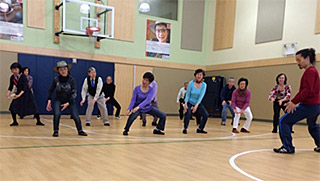Policy Briefs
In 2015, the White House Conference on Aging launched a series of Policy Briefs on its four topic areas: healthy aging, long-term services and supports, elder justice, and retirement security. The briefs defined and framed each issue and examined it from various perspectives. They also include comments collected from the WHCOA website, data from available resources, and the latest in evidence based information. Organizations in the aging field, other stakeholders, and individuals had the opportunity to comment on each of the briefs. The WHCOA collected responses and used them to help shape the 2015 national Conference. By providing input, organizations and individuals were able to be involved in the 2015 Conference in a meaningful and concrete way and help shape and influence its final vision and the Final Report.
Healthy Aging Policy Brief

Older Americans during movement exercise class at Asian Counseling and Referral Services, Seattle
Older Americans are calling for a shift in the way we think and talk about aging. Rather than focusing on the limitations of aging, older adults across the nation want to focus instead on the opportunities of aging. Older adults are seeking ways to maximize their physical, mental, and social well-being to remain independent and active as they age. [More]
Long-Term Services and Supports Policy Brief
Despite efforts to stay healthy and prevent disease, many older adults will eventually develop some degree of limitations and need additional paid or unpaid help with basic daily living activities.
 Long-term services and supports help older adults and people with disabilities accomplish everyday tasks such as bathing, dressing, preparing a meal, or managing money. These services include health and social services that may be needed to maximize the independence and well-being of an individual. Individuals of all ages may have functional limitations, but these limitations are most prevalent among adults age 65 and older. [More]
Long-term services and supports help older adults and people with disabilities accomplish everyday tasks such as bathing, dressing, preparing a meal, or managing money. These services include health and social services that may be needed to maximize the independence and well-being of an individual. Individuals of all ages may have functional limitations, but these limitations are most prevalent among adults age 65 and older. [More]
Elder Justice
As Americans live longer and technology becomes increasingly sophisticated, older Americans face new challenges and opportunities. While technology is helping individuals to live longer and healthier lives, older Americans may be susceptible to financial exploitation and other forms of elder abuse.
Elder abuse is a serious public health problem affecting millions of older Americans each year, with some studies suggesting that as few as one in 23 cases is reported to authorities. Elder abuse is defined as intentional actions that cause harm or create a serious risk of harm to an older person (whether or not harm is intended). Elder abuse encompasses physical abuse, neglect, financial exploitation, sexual abuse, as well as emotional and psychological abuse. [More]
Retirement Security
 Americans are living longer than ever before. In 2012, life expectancy at birth in the United States reached a record high of 78.8 years. A 65 year-old man can expect to live another 17 years and a 65 year-old woman another 20 years. As a result, older Americans have more time to help grow the economy, enrich their communities, and enjoy their families. But longer lives can also challenge older Americans’ financial security, increasing the risk of outliving their assets. [More]
Americans are living longer than ever before. In 2012, life expectancy at birth in the United States reached a record high of 78.8 years. A 65 year-old man can expect to live another 17 years and a 65 year-old woman another 20 years. As a result, older Americans have more time to help grow the economy, enrich their communities, and enjoy their families. But longer lives can also challenge older Americans’ financial security, increasing the risk of outliving their assets. [More]
This website was last updated on February 3, 2016. It is no longer being maintained; however, it remains here as an archive for information on the 2015 White House Conference on Aging forums, blogs, press releases and activities over the period from October 2014–December 2015.
Some material on this website may be superseded, as it was created at a particular time. It may contain references to activities, policies and programs that have no current application. Content in the archive may link to web pages that have moved or no longer exist, or may refer to other documents that are no longer available.
For further information on the use of these archived documents please contact the Administration on Aging/Administration for Community Living at aclinfo@acl.hhs.gov. To stay up to date on issues important to older Americans, please visit Aging.gov or the Administration on Aging.


